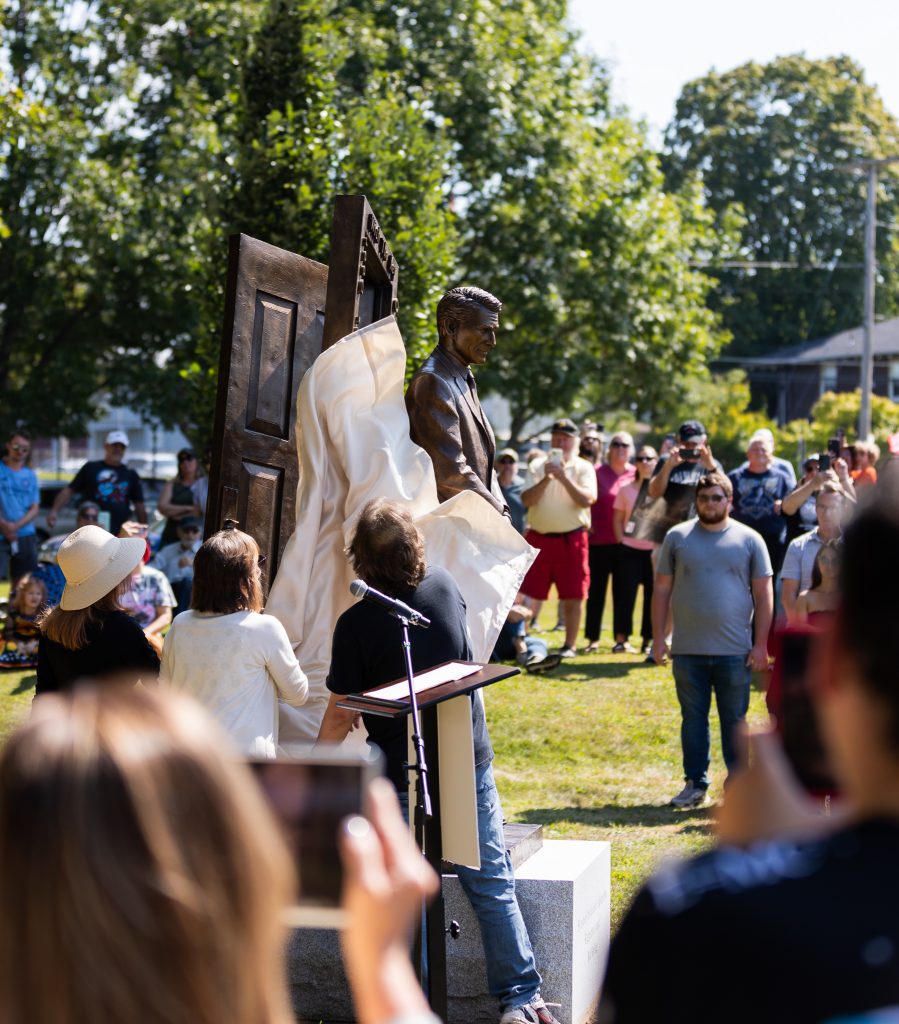The Rod Serling Memorial Foundation hosted SerlingFest this past weekend, celebrating the life, work and creativity of the screenwriter and television producer who called Binghamton his hometown.
Deemed the “Serling Centennial,” this year’s annual festival marked Serling’s 100th birthday, in addition to the 65th anniversary of the 1959 debut of “The Twilight Zone,” the series he created. To celebrate, the foundation’s annual SerlingFest was bigger and better than ever, spanning three days of events and closing with a statue dedication at Recreation Park.
The six-time Emmy award-winning writer was not only celebrated for his famous work but for his activism and fight for social justice both on and off the screen. According to the foundation, Serling “was known as the ‘angry young man’ of Hollywood, clashing with television executives and sponsors over a wide range of issues including censorship, racism, and war.”
Serling used much of his television writing to speak on political issues while providing viewers with the novel entertainment he is known for. With appearances by Serling’s daughters, foundation presenters and guest speakers, SerlingFest 2024 successfully captured unique aspects of Serling’s life and career.
Nicholas Parisi, 54, the president of the Rod Serling Memorial Foundation, discussed the writer’s fondness for the city of Binghamton.
“This was his hometown, and he was never shy about professing his love for his hometown,” Parisi said. “There are people who, once they become successful, they may shy away from their hometown. They may cover up their roots, they may not want to admit where they came from, as if they were just born in Hollywood and that’s where they were developed. But Rod was never shy about saying ‘Binghamton’s my hometown,’ and he dramatized his love for his hometown throughout ‘The Twilight Zone’ and other scripts as well.”
SerlingFest began in the Broome County Forum Theatre at 6 p.m. on Friday with a video marathon that showcased a variety of Serling’s works, from his first script produced on national television titled “Grady Everett For the People,” to episodes from his post-Twilight Zone western series “The Loner.” The night ended with a showing of two “The Twilight Zone” episodes titled “In Praise of Pip” and “Deaths-Head Revisited” introduced by Anne Serling, 69, one of Serling’s daughters and author of “As I Knew Him: My Dad, Rod Serling.”
Saturday’s events, commencing at 10 a.m. and lasting the entire day, featured a video tribute to Serling, multiple presentations, a Q&A and a raffle drawing.
Each presentation shared a unique aspect of Serling’s work and influence. For example, renowned music journalist and foundation member Gail Flug described how “The Twilight Zone” influenced the worlds of rock ‘n’ roll and pop, from Rush’s studio album 2112 featuring a song titled “The Twilight Zone” to allusions to the television series within songs, like Rockwell’s “Somebody’s Watching Me.”
Mark Dawidziak, 68, of Cuyahoga Falls, Ohio, described Serling’s impact on his home state from his time as a student at Antioch College, as well as plans to honor Serling’s legacy with a historical marker on the campus. A foundation member and the author of “Everything I Need To Know I Learned in the Twilight Zone,” a collection of life lessons and morality tales, Dawidziak said Serling’s works wield immense influence today.
“There are very few writers who wrote of their time and yet are timeless,” Dawidziak said. “In fact, a lot of ‘Twilight Zone’ episodes are more relevant, more resonant today, than when he was writing them.”
Mark Olshaker, 73, an Emmy-winning documentary filmmaker, a foundation member and a close friend of Serling, discussed the filmmaker’s social conscience and how it informed his life and work along with Dawidziak and Anne Serling in a panel presentation and Q&A.
“Rod was only a professional writer for 25 years, from the premiere of ‘Grady Everett for the People’ in 1950, until he died in June of 1975,” Olshaker said. “He was really a comet across the heavens. The amount of work he did in 25 years is just staggering, and we’re all influenced by that.”
On Sunday, SerlingFest came to a close with the unveiling of Serling’s statue in Recreation Park. Serling grew up only a few miles from the park and played there as a young boy.
Lissa Connelly, 66, of Binghamton, and a retired teacher who was part of the Fifth Dimension Curriculum program that teaches fifth graders about Serling and his messages of social justice, attended SerlingFest. She described the importance of keeping Serling’s spirit alive.
“His messages are timeless, whether they were written in ‘59, ‘57 or could’ve been written in 2024 — racism, tolerance, fascism, conformity, scapegoating, it’s just pretty powerful,” Connelly said. “With everything that’s going on in this world right now, I think we need him, and this statue is going to be a profound reminder of his words and what we need to do as a society.”
The bronze statue overlooks the park and Serling’s childhood home, depicting him in his iconic narration pose from “The Twilight Zone,” with the words “you unlock this door with the key of imagination” engraved into the doorway he walks out of.
The park served as the inspiration for the famous “The Twilight Zone” episode titled “Walking Distance,” one of Serling’s most personal works that follows a man who is unhappy with his life finding himself in his old hometown in the same period as when he was a boy.
Anne Serling, in her dedication remarks, said her father was shaped by his childhood near Recreation Park and his nostalgia for Binghamton.
“Every summer, when we came east, my dad would leave our cottage and take an annual pilgrimage back to Binghamton,” she said. “He would drive by his house on Bennett Avenue and make his way here to Recreation Park, sit on the bench and watch the merry-go-round. It seems only fitting that the statue would be erected here.”



